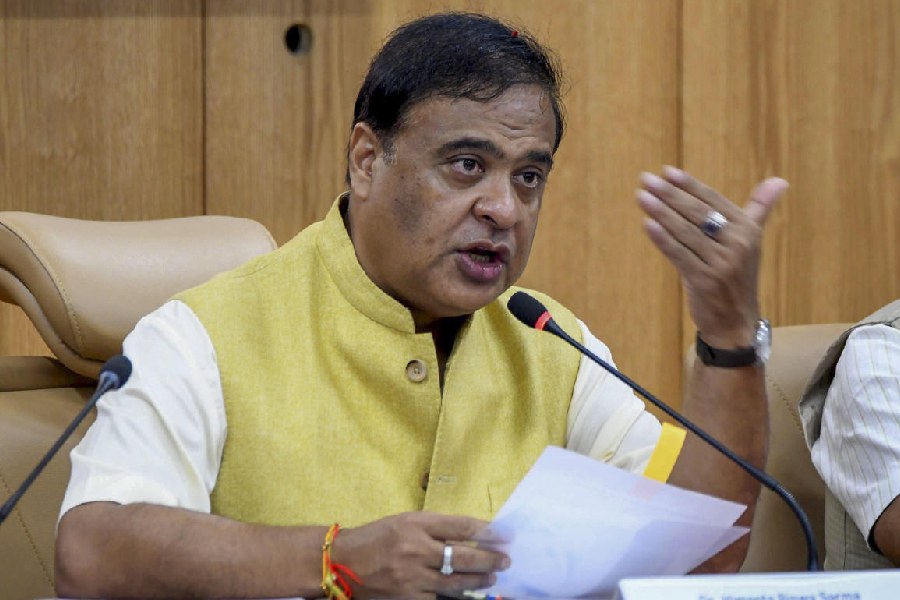 |
| Govind, who was injured in the Jaipur blasts, at a crematorium after performing the last rites of his father Ram Prasad who was killed on Tuesday. (AFP) |
New Delhi, May 14: India today worried about the future of a five-year-old ceasefire in Jammu and Kashmir after a wilful violation of the truce last evening around the same time as serial blasts in Jaipur raised suspicions in Delhi that developments in Pakistan could push the clock back to an eyeball-to-eyeball situation.
“The firing on the Line of Control is worrisome,” Prime Minister Manmohan Singh said here this evening. “The Directors General of Military Operations (DGMOs) are talking.”
A major reason for the worry is the timing of the ceasefire violation and the Jaipur blasts. Foreign minister Pranab Mukherjee is scheduled to visit Islamabad on May 21 to revive talks with his counterpart. The Prime Minister said that in those talks “all issues concerning national security will be taken up”.
Singh echoed the sentiment of the military establishment. Defence minister A.K. Antony, who said the ceasefire violation “was a cause for concern”, was inquiring after the results of a flag meeting that the brigade commander in Tangdhar, on the Indian side of the LoC, had requested for this evening.
An army spokesperson said between 70 and 80 rounds in short bursts were fired between 6pm and 6.30pm last evening from a post manned by a regular unit of the Pakistan Army that the Indian Army has named the “Papa Bunker”. This is between 10,000 and 11,000 feet overlooking the Tangdhar “bowl”.
The spokesperson said there was no casualty or damage as a result of the firing from a light machine gun. He said this was the first violation of the ceasefire by Pakistan since November 2003.
Although there have been stray incidents of firing across the LoC since 2003, none has warranted the kind of reaction from India that is in evidence this time. There was no retaliation by Indian troops but the matter has been taken up at the level of army headquarters and the political leadership.
The reason for the worry in Delhi is also compounded by the covering fire that Pakistani troops allegedly gave to militants who infiltrated through the International Border in the Samba sector of Jammu last week.
The infiltration was through a cordon manned by the Border Security Force and in a stretch of the border that Pakistan refers to as a “working boundary”.
 |
| Singh |
With two incidents of ceasefire violations, military top brass here wonder if this could mean the unravelling of the ceasefire. This apprehension has been conveyed to the political leadership.
On the Jaipur blasts, however, the Prime Minister was reluctant to point fingers just yet. But the minister of state for home affairs Sriprakash Jaiswal has indicated the involvement of the Harkat-ul Jehad and of elements in a “neighbouring country”that support it.
“Terrorists have the element of surprise,” Singh said. “But there is no lack of firmness in our resolve (to take on militants). We are investigating all possibilities. It will be premature to say anything at this juncture because that might interfere with the investigations,” he replied when asked for his assessment on which outfit masterminded the blasts.
The Prime Minister contested the allegation from right-wing hardliners that India was portraying the image of a “soft state” by doing away with laws like the Prevention of Terrorism Act (Pota). “Even when it was there, there were terrorist attacks. There is no dearth of laws,” he said.
No name
Junior home minister Jaiswal, who returned from Jaipur this morning, said the blasts smacked of a “deep-rooted and very well-planned conspiracy” to disturb communal harmony in the country and suggested that the links of the terror strike were in a neighbouring country.
Without specifying a single name, he said, it could be any country — Bangladesh, Pakistan, Nepal and Myanmar. They were all facing internal turmoil, he said.
He refused to name the terror outfit unlike after the Mumbai blasts in July 2006 when the government blamed Pakistan-based organisations.
He admitted that there was no specific intelligence input about the possibility of a terror attack on Jaipur. There was only a general alert after the Ajmer blast last year, he said.
Jaiswal took the opportunity to stress on the need for a federal investigating agency. “This incident has again underlined the need for having a federal investigating agency but till all states agree to that, it would be difficult to do so.”
Home minister Shivraj Patil and UPA chairperson Sonia Gandhi are expected to visit Jaipur tomorrow.










